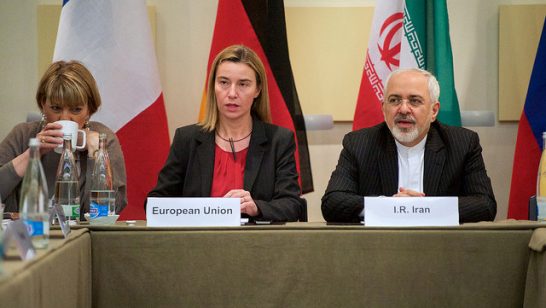
The US withdrawal from the Joint Comprehensive Plan of Action (JCPOA) and ensuing “maximum pressure” campaign against Iran has led to a diplomatic clash with the European Union and a quorum of its member states who are striving to protect the nuclear deal. There is, however, one issue on which US and European officials seem to be in agreement: that the Iranian people should be spared from the hardships of economic sanctions. Senior officials in the Trump administration have consistently emphasized that US sanctions are targeted against Iran’s leadership and not its ordinary citizens. If genuine, such statements point to one potential area of cooperation between Europe and the United States: ensuring that humanitarian trade can persist even under stringent US sanctions on Iran.
The latest ELN policy brief by Esfandyar Batmanghelidj and Axel Hellman suggests that the European Union’s recently announced special purpose vehicle (SPV) to facilitate financial transactions with Iran could prove an unlikely venue for cooperation, if established with a focus on humanitarian trade. Europe should make humanitarian trade the foundation of its economic relations with Iran through the establishment of a humanitarian SPV (H-SPV), which the United States, along with other actors, could be invited to join.
The establishment of an H-SPV could help Europe achieve several goals:
- Deliver more relief, more quickly. The H-SPV can be brought online faster, more reliably, and with a clearer direct impact on the wellbeing of the Iranian people than a general SPV.
- Advancing the cause of European economic sovereignty.
- Test US commitment to protect humanitarian trade. If the US accepts to join the H-SPV, Europe will have effectively neutralized the issue of compliance fears that might linger around any Iran-specific mechanism. If the US refuses, Europe will be further justified in pressuring US authorities for licenses and other measures that will provide comfort to its banks regarding the SPV.
- Protect diplomacy in the age of financial warfare. The experience of establishing multilateral mechanisms to sustain humanitarian trade will be invaluable in a world where the imposition of unilateral sanctions looks increasingly likely.
To achieve these goals, the H-SPV should be established in accordance with these criteria:
- It should focus exclusively on humanitarian trade.
- The focus on humanitarian trade would enable a functional linkage of the H-SPV to European banks, including European central banks. In this role it could serve as a kind of trading house, able to serve as an intermediary on behalf of European and Iranian companies.
- While an SPV focused on trade considered sanctionable by the US is unlikely to develop far beyond the netting service currently envisioned, the H-SPV could develop into a “gateway bank” which serves as an intermediary between the Iranian and European financial systems.
- While the H-SPV would be foremost intended to serve European companies, the mechanism could be opened to other trading partners, such as China and India. Europe should also invite the United States to participate in recognition of a shared commitment to ensure that the Iranian people are not unduly harmed by sanctions.
The opinions articulated above also do not necessarily reflect the position of the European Leadership Network or any of its members. The ELN’s aim is to encourage debates that will help develop Europe’s capacity to address pressing foreign, defence, and security challenges.




